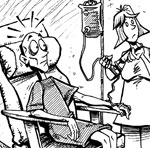Vitamin B6 Pyridoxine Is Vital for Fighting Fatigue as You Grow Older
| Share on Facebook | Share on Twitter | Share on Google+ |
Pyridoxine deficiency diseases are really rare. There were a few cases in the United States in 1952, when a maker of infant formula forgot to add vitamin B6, and it's also possible to become pyridoxine-deficient if you are taking the drug penicillamine for arthritis, scleroderma, or arsenic poisoning, or if you are taking the high-dose form of niacin known as Isoniazid for high cholesterol.
Even in the developing world, almost every manages to get enough vitamin B6 to avoid the classic symptoms of pyridoxine deficiency, which are anemia, inflamed lips, inflamed eyes, and personality changes sometimes leading to seizures. That isn't to say that everyone gets all the pyridoxine they need.
How pyridoxine prevents depression, fatigue, and overweight. Pyridoxine is very important in the human body as a co-enzyme. A co-enzyme is a substance that binds to an enzyme to activate it for a chemical reaction. Without the pyridoxal 5-phosphate the body manufacturers from pyridoxine, the body could not make natural steroids that control inflammation. It could not use selenium to fight free radicals. It could not recycle homocysteine, which becomes inflammatory to the blood vessels and brain when it is present in excess.
But the most noticeable effect of not having enough vitamin B6 for most of us is in the brain. Vitamin B6 helps keep an amino acid called tryptophan from getting broken down by the liver. (The liver can, to a limited extent, turn tryptophan into niacin, when niacin is deficient.) When there's more trytophan in circulation, more gets into the brain, where it is turned into a hormone called serotonin.
Serotonin is a mood elevating hormone. When your brain makes enough serotonin, you don't feel depressed. You have more energy, but not too much. You don't get the "munchies" as much, either.
That's because sugar also helps trytophan travel across the blood-brain barrier into the brain. If you are getting enough trytophan into your brain with the help of pyridoxine, then you don't get sugar and snack cravings. This helps help you lose weight, if you are dieting, or keep it off, if you aren't.
Who needs more vitamin B6? There are four groups of people who need more than the minimum recommended daily intake of pyridoxine, also known as vitamin B6.
- Women who take oral contraceptives (the Pill), which depletes the body of vitamin B6.
- People who take 5-HTP for depression. 5-HTP becomes tryptophan, and some of the tryptophan becomes a byproduct, kynurenine. The byproduct forces tryptophan out of the brain, but pyridoxine stops this process.
- People who don't get enough niacin. Of course, if you are niacin-deficient, you need to take niacin! But vitamin B6 can keep the liver from turning tryptophan into niacin. And,
- People who have any of the diseases that are caused by the build up of advanced glycation end-products, which are essential "caramelization" of proteins all over the body due to prolonged exposure to too much sugar.
Most people should not take just a pyridoxine/B6 supplement. There is always a balance between niacin (B3), methylcobalamin (B12), and getting the full range of amino acids. But getting a balance of B vitamins can be helpful in an enormous range of health conditions, including acne/rosacea, autism, attention deficit disorder and attention deficit-hyperactivity disorder (ADHD), rheumatoid arthritis, allergies, depression, high homocysteine, heart disease, elevated lipid levels, immune depression, morning sickness, depression associated with pregnancy, depression associated with oral contraceptive use, premenstrual syndrome and premenstrual dysphoric disorder, menopause symptoms, age-related cognitive decline and memory loss that is not caused by Alzheimer's, muscle cramps, chapped lips, conjunctivitis, bladder infections, high blood pressure, water retention, diabetic kidney disease, asthma, carpal tunnel syndrome, canker sores (aphthous ulcers), many forms of schizophrenia, vertigo,and overweight.
-
Skin CareMen Skin Care
-
Free ResourcesFree eBooks
-
Half of the modern drugs could well be thrown out of the window, except that the birds might eat them.Dr. Martin Henry Fischer
-
What We RecommendIf you do an analysis of the ingredients in a bottle of
 Total Balance and compare with other products you will find that it provides exceptional value for money…even against simple mass produced products with lower bottle costs.
Total Balance and compare with other products you will find that it provides exceptional value for money…even against simple mass produced products with lower bottle costs.
-



















